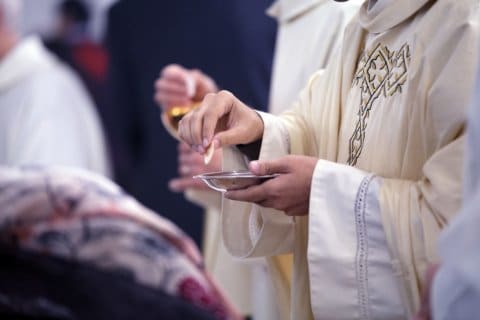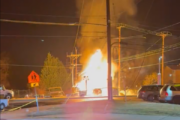WASHINGTON — A judge on Thursday ordered the Rev. Urbano Vazquez, a D.C. priest accused of sexually abusing parishioners, to remain in a local jail cell until trial despite an offer from a robed friar to ensure Vazquez would have no contact with children at the Pittsburgh-area friary where he had been staying.
In a detention hearing in D.C. Superior Court, Robert Bonsib, the attorney for Vazquez, asked Judge Juliet McKenna to allow Vazquez to remain at the Saint Conrad Friary, in Allison Park, Pennsylvania, saying “he has basically been confined there” since his initial arrest last month.
In November, Vazquez with charged with one count of second-degree child sexual abuse, and had stayed at the religious enclave “with a safety plan” dictated by the friars, said Bonsib.
On Tuesday Vazquez was charged with two more crimes — second-degree sexual assault of another minor, as well as the misdemeanor assault of an adult woman.
As WTOP first reported, a 9-year-old girl told police Vazquez had kissed her on the mouth and inappropriately touched her approximately 60 times in 2017.
Bonsib said Vazquez had demonstrated he is not a flight risk, as he has appeared in court several times in the past weeks despite knowing prosecutors intended to ask he be held without bond.
“He had the opportunity to flee, and he has not,” said Bonsib.
Father Frank Yakobi, wearing the brown hooded tunic, with a cord fastened around the waist, has been accompanying Vazquez since he started staying at the friary.
“Given the nature of the allegations, this is a grave concern for our order,” said Yakobi, in describing his willingness to notify prosecutors, the defense and the court if Vazquez violated any pretrial conditions set by McKenna.
Assistant U.S. Attorney Matt Williams argued there were no conditions, other than incarceration, that could guarantee Vazquez would not reoffend.
“He is accused of the violent sexual abuse of a 9-year-old and 13-year-old child,” Williams said. “His opportunistic behavior exploits moments when victims are most vulnerable.”
Williams said Vazquez had the “audacity” to continue to abuse parishioners after being confronted by a supervisor in 2016.
“He should have been walking on eggshells,” said Williams. Instead, “It empowered him.”
Williams confirmed in court that in addition to the three victims Vazquez has been charged with abusing, three other victims — two minors and an adult — had accused him, but the statute of limitations had expired.
The District’s three-year-limit for prosecution of less-serious crimes is “inexplicably short, especially for a child case,” noted Williams.
In announcing her ruling, McKenna touched upon Williams’ concern that the church “has a history of nonreporting.” In Vazquez’s case, the main priest at Shrine of the Sacred Heart and the coordinator for child protection were placed on leave for failing to follow protocols, according to the Washington Archdiocese.
“There were surely people in the church who were aware, or who knew the victims,” said McKenna, in describing why she didn’t trust church officials to monitor Vazquez. “These are colleagues of the defendant.”
McKenna said, based on the allegations, Vazquez violated “a position of trust and authority” and ordered him held without bond.
His attorneys will be allowed to argue again for his release before trial. Vazquez’s next hearing is scheduled for Jan. 16.








